Types of RVs and Campers
In the RV lifestyle, there are a number of different classifications, and there is truly something for everyone. There is no one-size fits all and the right RV is different for each of us. Deciding what kind of RV is right for you will depend on a lot of variables: How many folks will travel with you? How often will you use it? Will you be taking weekend getaways? Short trips or extended travel? Where will you travel to? What's your budget? What features are important to you? The list seems endless!
One of the best ways to see a lot of different types of RVs is to visit an RV Show. Visit our RV Shows page for a list of all of the RV Shows in Texas.
If you are just beginning your RV search, with so many options out there, the experience can be truly overwhelming! So let's begin with the basics to help you narrow down which type of recreational vehicle might be the best fit for you. Here's a brief description of the different types of Recreational Vehicles and, in our opinions, the advantages and drawbacks of each. Let's take a closer look...
Different RV Types
A great way to try out different types of RVs is to rent! Visit our Rent an RV page to find an RV to rent near you!
Types of Towable RVs: Camping Trailers and Fifth Wheel Trailers
When looking at an RV trailer, be sure to choose a camper that can be towed safely by your truck. Every towable RV has a weight rating. We recommend that you have a good amount of "wiggle room" between the weight of the camping trailer and your truck's towing capabilities.

Pop-Up Camper Advantages: Very lightweight. Easy to pull by almost any vehicle and can be towed by a smaller vehicle. Very affordable and a popular choice among tent campers and small families who want a few more comforts than a tent can provide. A folding trailer is also a great choice for budget conscious RV shoppers. These tent trailers can be stored in your garage (so no storage fees!). Compact size will fit into any campsite. Can be turned within the campsite to maximize space, view and privacy. You can leave the campsite without packing up the camper. For tent enthusiasts, you still have the feeling of sleeping under canvass, but with the convenience of a camper. Traditionally soft sided, but some manufacturers make a-frame or hard-sided pop-ups. Electrical hookups are 30amp.
Pop-Up Camper Drawbacks: Requires a lot of set-up and take-down time. Very limited storage. May not have shower or restroom facilities. Very small fresh water, grey water, black water tanks. Does not come with a generator. Typically comes with one battery and one small propane tank on the front of the trailer. Most have fabric sides which have to be allowed to dry before storing.
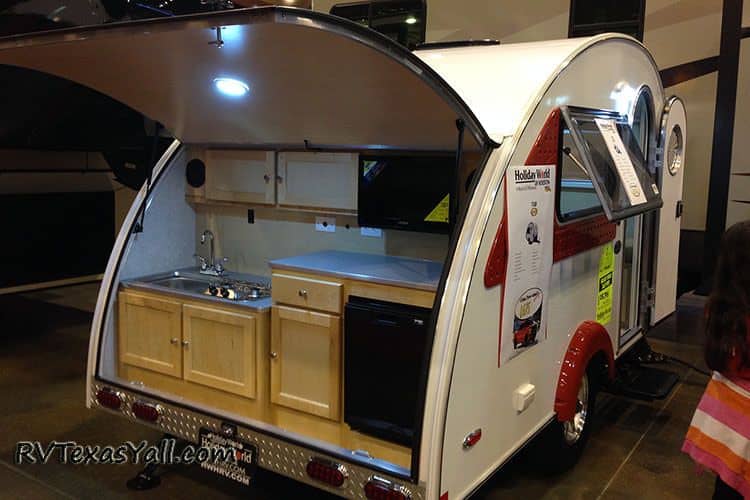
Teardrop Trailer Advantages: Teardrop trailers are travel trailers that are known by their smaller size. But they are so unique, we think they deserve their own category. Compact, lightweight and easy to pull by many vehicles, teardrop trailers may include the basic amenities: a kitchen, bathroom, couch, dining area, and bed (in various configurations). Many include air conditioners. Fit into any campsite and can be easily positioned to make the best use of your campsite. Typically uses 30amp electric. All sides are hard sides. A Teardrop might be the right choice for the solo traveler or couple who enjoy short trips.
Teardrop Trailer Drawbacks: Small space. Very limited storage. Water, grey and black tanks may be small. On some models, kitchen is outside only. May be uncomfortable depending on your height. No generator included.

Hybrid Trailer Advantages: A hybrid travel trailer is a cross between a pop-up camper and a travel trailer, so you have more space than a pop-up but at a lighter weight than a typical travel trailer. Fits into most campsites. Tent enthusiasts keep the feel of sleeping under canvass. Can leave your camper set up as you go explore in your truck. Full bathroom and kitchen facilities as well as fresh water, grey and black tanks. Requires less set-up time than a pop-up camper. Typically come with two standard propane tanks (compared to one tank on a pop-up). Electrical hookups are usually 30amp. Like other travel trailers, hybrid trailers might include bunk beds and full bathrooms.
Hybrid Trailer Drawbacks: Requires more set-up time than a traditional travel trailer. Will not fit into a standard garage, so you will probably have to pay to store it. The canvass areas must be allowed to dry before being packed up. Limited exterior storage. No generator included.
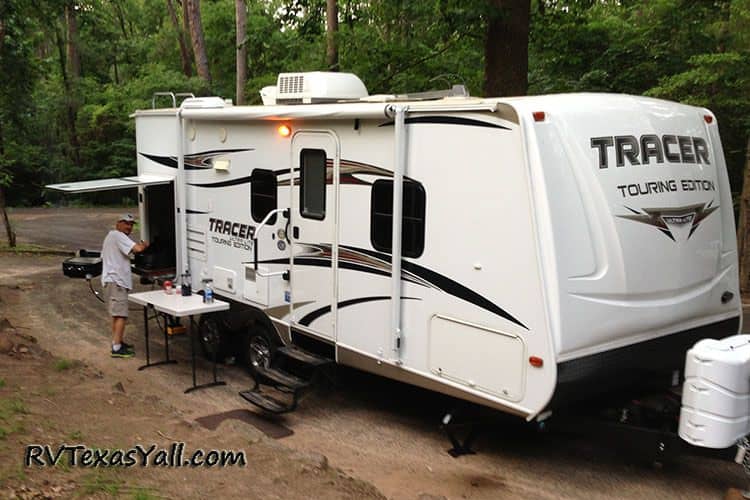
Travel Trailer Advantages: Large range of lengths, weights and floorplans available. Many include decent amount of interior and exterior storage. Some include outdoor kitchens. Some travel trailers can sleep a lot of people. All sides are hard sides which provides better insulation than traditional pop-ups or hybrids. Except for a few very small campers, these include full kitchens and bathrooms along with fresh, grey and black water tanks. You can leave the camper set up at the campsite while you explore the area in your truck. Less set up time than a pop-up or hybrid trailer. Electrical hookups are generally 30amp. Smaller travel trailers can fit in most campsites.
Travel Trailer Drawbacks: Requires a truck strong enough to safely tow. Because of the wide range of travel trailers available, weights vary tremendously. Make absolutely sure that your truck is rated to tow more than the weight of your camper when it is completely packed and full of water. Can lower gas mileage due to weight and wind resistance. More set-up time than a motorhome. Larger travel trailers may be limited in the number of campsites they fit into. No generator included.
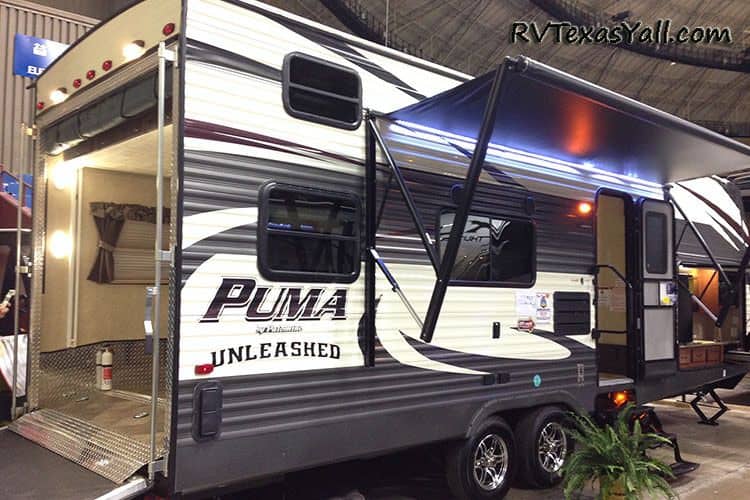
Toy Hauler Advantages: Available as either a travel trailer or a fifth wheel, toy haulers give you room in your towable to carry your motorcycles, golf carts, four wheelers, dirt bikes or other toys. These are also called Sport Utility RVs. The "garage" area often converts into additional living, office space or sleeping space. Ramp sometimes converts to patio. Include all of the amenities of other travel trailers or fifth wheels. Some manufacturers are now also building Class C, Super C, and Class A Gas Toy Hauler Motorhomes.
Toy Hauler Drawbacks: Especially when loaded, tend to be heavier than their traditional counterparts because of the ramp and your toys. Even though interior storage space is a huge plus for Toy Haulers, exterior storage may be limited. Some do not come with a generator.
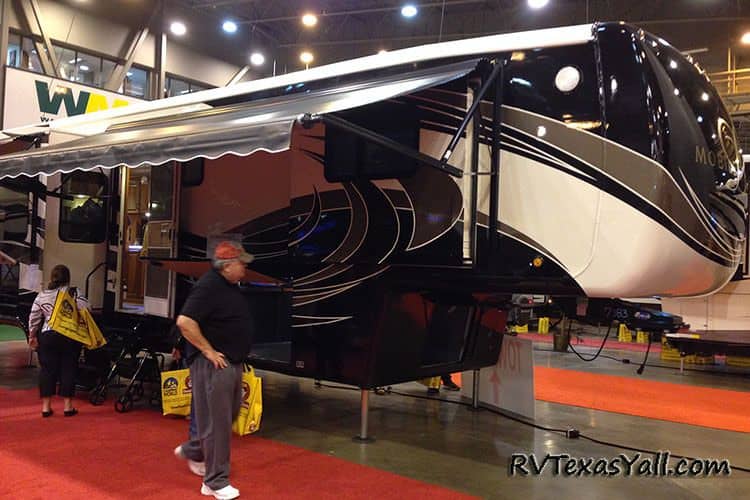
Fifth-Wheel Advantages: Tons of space! Among the largest RVs, fifth-wheels have more living area space than any other type of RV. This interior space might make a fifth wheel a great option for full-time RVers or large families. Wide variety of sizes and floorplans available. Connects to the inside bed of your truck giving you more control. Lots of storage. Some include outdoor kitchens and outdoor televisions. And we've seen a few with side patios! Can leave the campsite set up while you explore in your truck. Most fifth-wheels use 50amp electric. 5th wheels definitely feel like a home on wheels when you are inside.
Fifth-Wheel Drawbacks: Can be very large. You need a heavy duty truck to pull safely. Because of size, campground choices can be limited. You lose the ability to carry a lot in the bed of your truck because of the hitch mount. Unless you own property, you'll probably be paying to store it. Sometimes does not include a generator.
Types of Motorhomes: Class A RVs, Class B RVs and Class C RVs
When considering a motorhome, don't forget to think about your tow vehicle. With many motorhomes, it is easier to explore the local area with a separate car and leave the RV set up in the campsite. If you are intimidated by driving a motorhome, RV classes are available to help you become more comfortable behind the wheel.
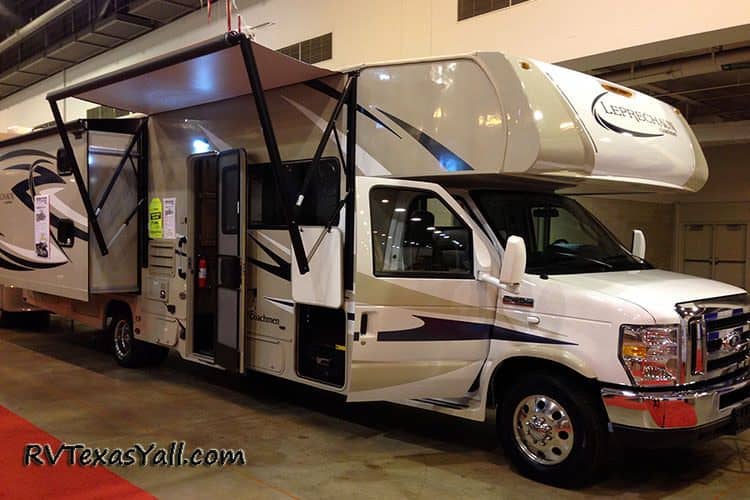
Class C Advantages: Class C RVs are the first class of motorized RV that we'll talk about. You ride inside of your RV instead of pulling it. A Class C is built on a truck chassis. Riding inside the RV provides easy access to your own bathroom and kitchen while traveling. Drives like a standard truck. Come in a variety of lengths and floor plans. Typically rated to pull between 5,000 and 8,000 pounds so you can pull a small car or boat for exploring. Easier to set-up than a towable RV. Comes equipped with generator making dry camping easier. Typically requires 30amp electric. Sits low to the ground making entry and exit easy. Includes standard truck driver and passenger doors as well as camping door. This is a popular type of RV for a small family, often including multiple sleeping areas in a small space.
Class C Drawbacks: Many have limited storage. Check closely for weight restrictions to make sure that you do not overload. Typically leveled at the campsite by driving onto leveling blocks. Bunk over cab can limit your view of the landscapes around you. Because these ride low, be particularly cautious as you enter or exit areas with dips in the road so that you minimize the chance of your back end scraping. (particularly true for longer units) You might not want to drive your RV around to explore the local area; bring a separate car for that.
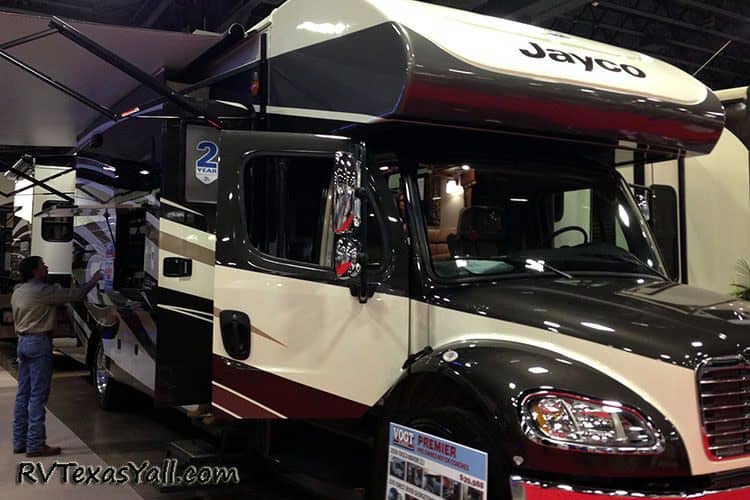
Super C Advantages: These are the big brothers of the Class C world with diesel engines and typically a larger chassis. Can carry more and tow more than a traditional Class C motorhome. Tend to be larger, have more storage, and ride a bit higher than a traditional Class C. Some come with automatic leveling jacks. Comes equipped with a generator. Typically use 50amp electrical service.
Super C Drawbacks: More expensive than a traditional Class C motorhome. View of the landscape while you are traveling is limited by bunk over cab. Because these units tend to sit higher than a traditional Class C, there are more steps required to enter and exit. Large size limits campsite options. Diesel engines are more expensive to maintain than gas engines. Bring a separate vehicle if you would like to explore the area. You will have to pay to store your rig.
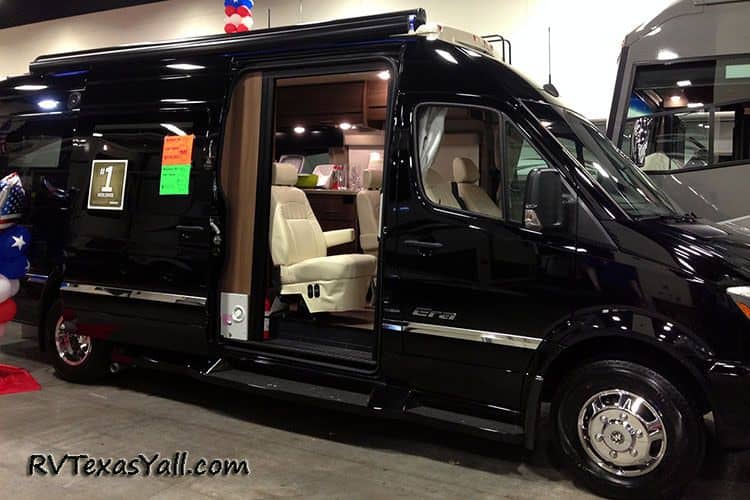
Class B Advantages: The size of a van, Class B motorhomes can camp anywhere. These may also be called Camper Vans. Class B van campers drive and ride like a van because they are built on a van chassis, but include a small kitchen, restroom and bed. Will fit in a standard driveway, so you don't have to pay to store it. Best suited for one or two people. Uses 30 amp electrical service. Can park in small campsites. Some Class B motorhomes are built on a sprinter chassis with a diesel engine. Some come with a generator. Easy to get in and out of: you can enter or exit just like a van, through the driver or passenger doors or sliding door on the side. Some camper vans have gas engines and some have diesel engines.
Class B Drawbacks: Very limited storage and living space. Everything is small inside. Small fresh water, grey and black tanks. Bathroom is normally a "marine bath" meaning that the toilet is in the shower. Can get fairly expensive for their size.
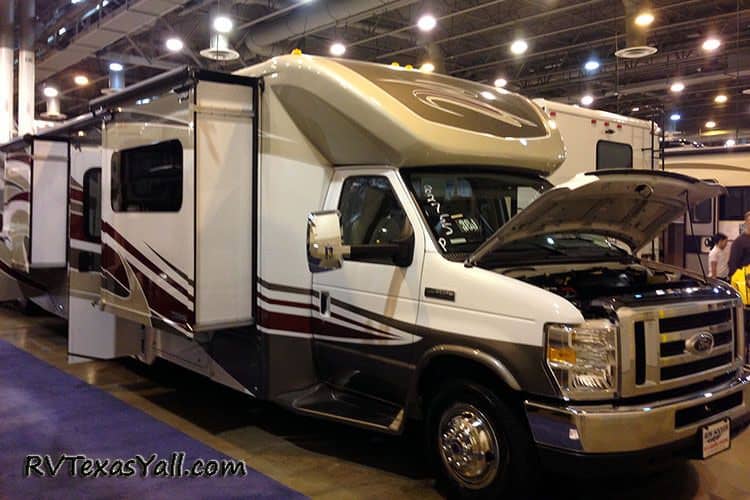
Class B+ Advantages: At first glance, a B+ Motorhome looks like a Class C. The difference is that it has no bunk above the cockpit. Larger than a Class B Motorhome. Has the living space of a Class C (except for the cab overhead). The cab over area in a B+ is often used for the entertainment center or storage. Better overall landscape view than a Class C because of the lack of bunk overhang. Wide variety of lengths and floorplans available. Typically uses 30 amp electric. Includes generator. Like a Class C, a B+ sits fairly low to the ground, so they are easy to get in and out of compared to higher RVs. Some B+ motorhomes have diesel engines.
Class B+ Drawbacks: Storage may be limited. Check closely for weight restrictions to make sure that you do not overload. Typically leveled at the campsite by driving onto leveling blocks. Because these ride low, be particularly cautious as you enter or exit areas with dips in the road so that you minimize the chance of your back end scraping. (particularly true for longer units) If you want to explore the area, we suggest bringing a separate car.
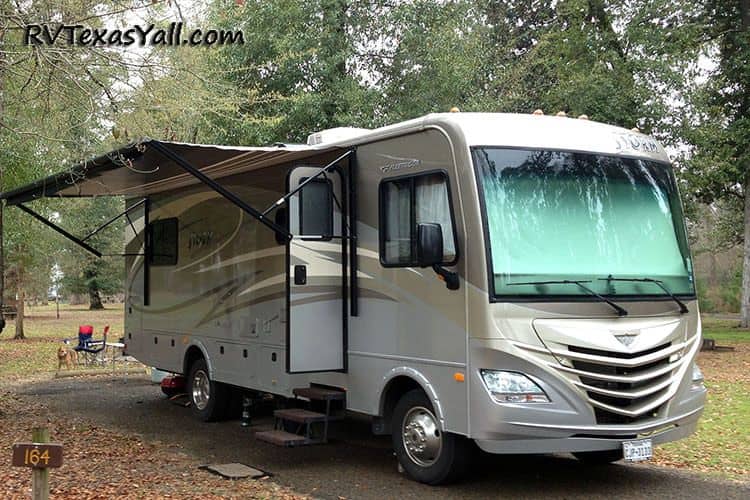
Class A Gas Advantages: In our opinion, a huge plus for any Class A motorhome is that the large picture windshield gives you a fantastic view of the road and landscape. Sits up high so you have good visibility. Open floorplan feels more spacious than many Class C motorhomes. More storage than a traditional Class C. Some models offer hydraulic bunks that drop down over the cockpit and provide additional sleeping space when camping. Often comes equipped with automatic leveling jacks making set-up very easy and quick. Generally uses 30 amp power and comes with generator, although some larger units may operate on 50amp electric. Typically rated to tow about 5,000 pounds. Has one door in the cabin to enter and exit; no traditional cab doors.
Class A Gas Drawbacks: Wider than a Class C. Check your weight restrictions carefully so that you do not overload. May not get very good gas mileage due to weight and wind resistence. Because these units sit so high, they require more steps to get in and out than most other motorhomes. If you want to explore the area, bring a separate car. With the engine in front, these units can be loud when driving. You will have storage costs.
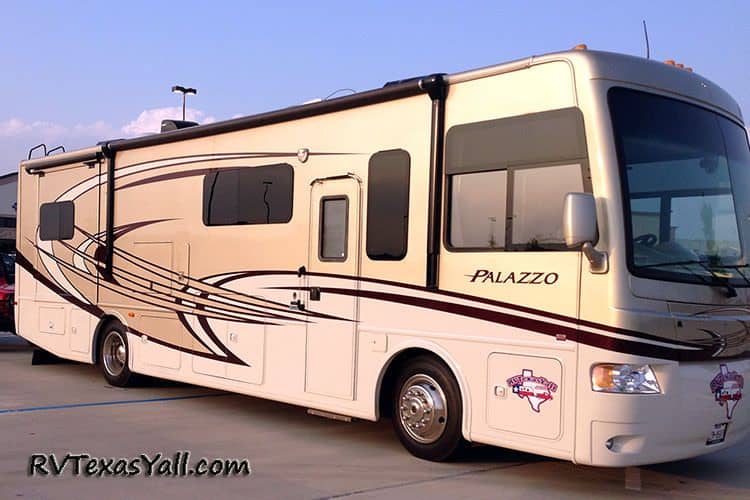
Class A Diesel Pusher Advantages: Available in a wide variety of sizes and floorplans. The diesel pusher class includes the big boys of the motorhome world! The diesel engine is mounted in the back making the ride much quieter than a Class A Gas. The larger chassis and more powerful engines provide a smooth ride even in the mountains and most can tow larger vehicles. Many diesel pushers are equipped with air suspension which raises the entire coach higher to drive and lowers to a very manageable height for easy entry and exit when camping. Some come equipped with residential refrigerators, washers and dryers or dishwashers. Leveling jacks make most of these units a breeze to set-up quickly. Come equipped with a generator and inverter. Use 50amp electrical power. Diesel pusher motorhomes are often the choice of many full-time or extended trip RVers who like to move often. This class of RV also tends to ride more smoothly than many other motorhomes.
Class A Diesel Pusher Drawbacks: Because of their length (most ranging from about 35 feet to 45 feet long), height, and width, Diesel Pushers are limited in their campsite options. Larger, heavier RVs require a special license in many states. Tow a vehicle if you want to explore the area. Diesel motorhomes cost more than gas models as does diesel maintenance. You will also pay to store your rig.
Other Types of RVs
Not really a towable RV or a motorhome... campers in the bed of a truck are a segment all of their own!
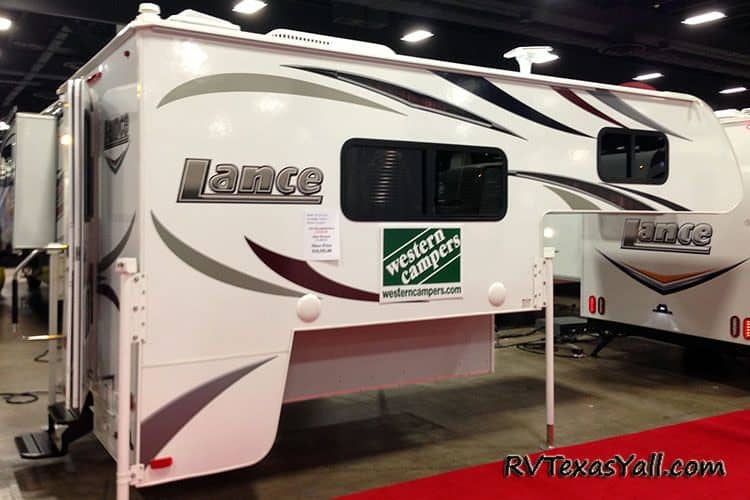
Truck Camper Advantages: Turns your truck into a camper! A truck camper is an RV that fits into the bed of a pickup truck. Fits into any campsite. Can be removed from the bed of the truck when you are not camping. Depending on your truck's capabilities, you can tow a boat or trailer behind. May include kitchen, shower and restroom as well as fresh water, grey and black tanks. No soft sides. Because it is mounted in your truck bed, you can RV anywhere your truck can take you. Electrical hookups are 30amp.
Truck Camper Drawbacks: Limited storage. Too large to fit inside a standard garage, so you might have to pay to store it. Very compact. If you want to explore the area in your truck, you either have to pack up the camper or remove the entire camper from the truck. Sometimes does not include generator.
What Type of RV is Right For You?
So what is the perfect RV for your road trips? Whether you choose a new RV or a new-to-you RV, the smallest camper or the largest RV, with slide outs or without, we hope you get out there and enjoy the RV life!
Video: What Type of RV Should I Buy?


